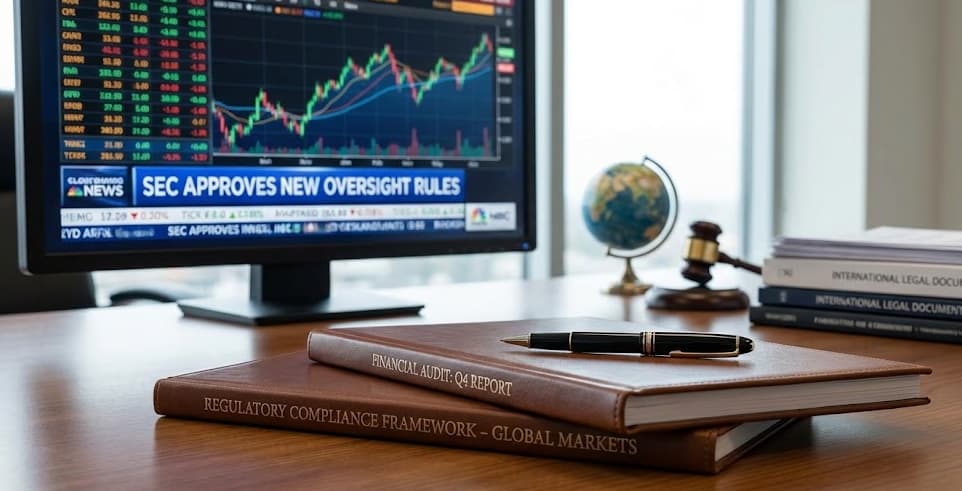China’s capital markets law plays a crucial role in regulating the country’s financial markets and ensuring a stable investment environment. For foreign and domestic investors, understanding these laws is essential for navigating the complexities of China’s financial landscape. Compliance with capital markets regulations can help investors avoid legal issues and make informed investment decisions.
In this guide, we’ll break down the key elements of China’s capital markets law and explain how they affect investors. By understanding the legal framework, you can better protect your investments and capitalize on opportunities in one of the world’s largest and fastest-growing markets.
Learn more about the regulations governing international investments by reading our guide on China Foreign Investment Law.
Overview of China's Capital Markets

China's capital markets have evolved significantly, driven by regulatory reforms and the establishment of various stock exchanges. The two primary exchanges are the Shanghai Stock Exchange (SSE) and the Shenzhen Stock Exchange (SZSE).
Key Features
- Shanghai Stock Exchange (SSE): Established in 1990, it primarily lists large state-owned and blue-chip companies. It plays a crucial role in attracting foreign investment.
- Shenzhen Stock Exchange (SZSE): Launched in 1990 as well, it focuses on smaller, high-growth companies. The ChiNext board within SZSE is tailored for innovative startups.
Regulatory Framework
China's capital markets are regulated by the China Securities Regulatory Commission (CSRC). The CSRC oversees market operations, enforces laws, and protects investor interests.
Recent Reforms
In 2023, China initiated a comprehensive reform of the A-share market, shifting to a registration-based IPO system. This aims to streamline the process for companies going public and enhance market transparency.
Emerging Markets
The Beijing Stock Exchange (BSE), established in 2021, caters to small and medium-sized enterprises. It represents an important component of China's multi-tiered capital market.
Regulatory Environment
The regulatory environment of China’s capital markets is characterized by multiple layers of oversight and evolving legislation. Key regulators and their associated frameworks play vital roles in ensuring market integrity, compliance, and the enforcement of legal standards concerning trading practices.
Main Regulators and Legislation
You will find that the primary regulator for China’s securities market is the China Securities Regulatory Commission (CSRC). The CSRC oversees securities and futures market operations, ensuring adherence to the law.
Important legislation includes the Securities Law, which underwent a significant revision in 2019 to enhance transparency, shareholder rights, and corporate governance. Current regulations also include comprehensive rules on initial public offerings (IPOs) and ongoing disclosures, reflecting a shift towards a registration-based system.
Key Regulators:
- China Securities Regulatory Commission (CSRC)
- Shanghai Stock Exchange (SSE)
- Shenzhen Stock Exchange (SZSE)
These entities work together to enforce regulations concerning de-listing and continuing obligations for public companies.
Compliance and Market Abuse
Compliance is integral to maintaining market integrity, and you must be aware of the rigorous standards companies must follow. The CSRC has issued numerous regulations aimed at preventing market abuse, including insider trading and fraudulent activities.
Market abuse regulations require timely disclosures about material events and ongoing compliance with financial statement filings. There are severe penalties for non-compliance, which underscore the commitment to a transparent market environment.
Important Compliance Aspects:
- Timely disclosure of material information
- Regular financial reporting
- Continuous professional standards for market participants
Insider Dealing and Legal Sanctions
Insider dealing is a serious offense in China, and the legal framework is strict in addressing it. The Securities Law imposes heavy penalties for any individual or entity found guilty of insider trading.
These sanctions can include significant fines and even criminal charges resulting in imprisonment. The CSRC actively investigates suspicious trading practices and utilizes a monitoring system to detect potential violations.
Sanction Categories:
- Administrative Penalties: Fines and trading restrictions
- Criminal Liability: Jail time for severe offenses
Market Entry and Listing Requirements

Entering the Chinese capital markets involves navigating specific requirements tailored for both domestic and foreign issuers. Understanding these requirements is crucial for market participants, whether they are Chinese companies or international firms.
Domestic and Foreign Issuers
If you are a domestic issuer, your path to listing typically involves meeting robust requirements that include financial track records, governance standards, and compliance with local regulations. For instance, companies must demonstrate profitability or a solid business model.
Foreign issuers face additional complexity, as they must comply with both Chinese regulations and those of their home countries. Depending on the listing location (e.g., Shanghai, Shenzhen, or Hong Kong), different authorities may impose varying standards. Familiarize yourself with reduced disclosure obligations that may apply to certain registered companies, allowing for a streamlined process.
Equity Offering Processes
The equity offering process in China can differ significantly between domestic and foreign companies.
For public offerings, firms need to prepare comprehensive documentation, with timelines that can extend several months. Meanwhile, private equity offerings often present more flexibility, albeit with restrictions on the type of investors involved.
Advisory firms play a vital role here, guiding you through the complexities of regulatory compliance and market expectations. Knowing the specific offering structures, such as the issuance of shares or convertible bonds, is crucial for a successful market entry.
Disclosure and Prospectus Provisions
Disclosure requirements are central to the market entry process. You will need to prepare a prospectus that provides potential investors with crucial information about your company’s financial health and business strategies. This document is often considered the main offering document.
Chinese regulators enforce stringent requirements regarding the content and accuracy of disclosures. Key elements include:
- Financial statements audited by reputable firms
- Risk factors related to your business model
- Use of proceeds from the offering
Fundraising Activities
In the context of China's capital markets, fundraising activities encompass essential processes like marketing, bookbuilding, and underwriting. These activities are crucial for attracting investors and ensuring a successful capital raise.
Marketing and Bookbuilding
Effective marketing is vital for fundraising in China. You should be aware of the different channels available for reaching potential investors, including social media, webinars, and industry conferences. Your marketing strategy should convey the value proposition of the investment opportunity clearly.
During the bookbuilding phase, you gather interest from institutional and retail investors. This involves determining the demand for your securities by offering them a chance to submit indication of interest. A well-organized bookbuilding process helps in establishing the price range and strengthens the overall fundraising effort.
Key elements to consider include:
- Investor Targeting: Identify suitable investors who align with your fundraising goals.
- Feedback Collection: Use initial responses to gauge market appetite and adjust offers accordingly.
- Timetable Management: A clear timeline ensures that marketing and bookbuilding activities lead to swift fundraising.
Underwriting and Price Stabilisation
Underwriting plays a critical role in guaranteeing financial stability during fundraising. When you engage underwriters, they agree to purchase any unsold shares, thereby reducing risks. This process helps in setting an appropriate price for your issuance.
Price stabilization measures also come into play after the fundraising. If your securities trade below the offering price, underwriters may step in to support the market. This intervention can include buying shares to stabilize prices, maintaining investor confidence.
Key factors in this process include:
- Underwriter Selection: Choose underwriters with strong reputations and networks.
- Stabilisation Techniques: These may involve buying back shares or maintaining liquidity in the market.
- Market Monitoring: Continuous assessment of trading conditions ensures that interventions are timely and effective.
Ensure you're fully informed about doing business in China by exploring China’s Legal Framework for Foreign Businesses.
Tax Considerations and Market Participants
Understanding the tax implications in China's capital markets is essential for effective participation by investors. Institutional investors play a crucial role in navigating these complexities, ensuring compliance while optimizing their investment strategies.
Tax Regime for Securities Trading
In China, the tax structure for securities trading includes several key components. Capital gains tax is generally applicable to individual and institutional investors, although exemptions may exist for certain types of transactions.
Key Tax Components:
- Individual Investors: 20% capital gains tax on profits from stock trading.
- Institutional Investors: Varies based on the entity structure; usually benefits from preferential tax rates.
- Transaction Tax: A stamp duty of 0.1% is levied on stock transactions.
Additionally, tax regulations may evolve, impacting the obligations on both domestic and foreign investors. Keeping updated on any changes is vital for maintaining compliance and optimizing returns.
Role of Institutional Investors
Institutional investors, such as mutual funds, pension funds, and insurance companies, significantly impact capital markets. Their substantial capital inflow contributes to market stability and liquidity.
Institutional Investor Considerations:
- Tax Efficiency: They often employ strategies to minimize tax liabilities, leveraging exemptions and deductions.
- Regulatory Compliance: Institutional investors must closely adhere to tax regulations specific to their structures, ensuring all obligations are met.
- Investment Strategy: The tax environment influences their asset allocation decisions, impacting overall market trends.
Ready to establish a business in China? Discover the steps to setting up a Wholly Foreign-Owned Enterprise (WFOE) in our detailed guide on How to Set Up a WFOE in China.
Conclusion
Understanding China’s capital markets law is essential for any investor looking to succeed in this dynamic and complex financial environment. By staying informed about the regulations that govern market activities, you can make better investment decisions and protect your interests. Navigating these laws can be challenging, but being aware of the legal framework helps mitigate risks and unlock opportunities in China’s rapidly growing market.
For further insights into how China’s legal landscape affects international relations, check out our guide on China Foreign Relations Law.
Frequently Asked Questions
What is the capital control law in China?
Capital control laws in China regulate the flow of funds in and out of the country. These regulations are designed to maintain financial stability and control currency fluctuations. They dictate how much capital can be transferred abroad and the investment avenues available for foreign entities.
Is Capitalism allowed in China?
China operates under a socialist market economy, which allows certain capitalist practices. While private enterprises exist, the state retains significant control over key industries. Capitalism is practiced within a framework that adheres to socialist principles and government oversight.
What is the foreign investment law in China?
The foreign investment law in China, effective from January 1, 2020, aims to create a more transparent and favorable environment for foreign investors. It consolidates previous regulations, ensuring equal treatment for domestic and foreign companies. Key provisions include protections for intellectual property and a streamlined approval process for foreign investments.
Who regulates the capital market in China?
The China Securities Regulatory Commission (CSRC) is the primary regulator of the capital markets in China. It oversees security offerings, trading activities, and market practices to ensure investor protection and market integrity. The CSRC enforces compliance with regulations to maintain a fair trading environment.
Is China a regulated market?
Yes, China is considered a regulated market. The government imposes strict regulations to regulate stock exchanges, public offerings, and securities trading. These regulations are intended to prevent fraud, manipulate markets, and ensure proper corporate governance within the capital markets.
What is the registered capital requirement for China?
The registered capital requirement for businesses in China varies by industry and location. Generally, companies must demonstrate a minimum capital threshold. This threshold can range from RMB 30 million to RMB 50 million, depending on the type of business and its operational scale. Proper registration is essential for legal compliance and operational legitimacy.
Subscribe to receive updates
Subscribe to receive the latest blog posts to your inbox every week.






